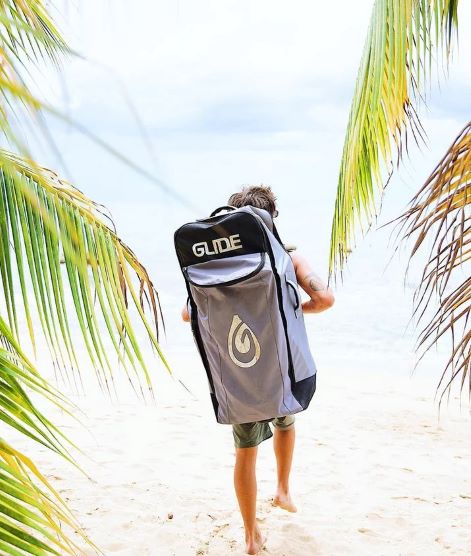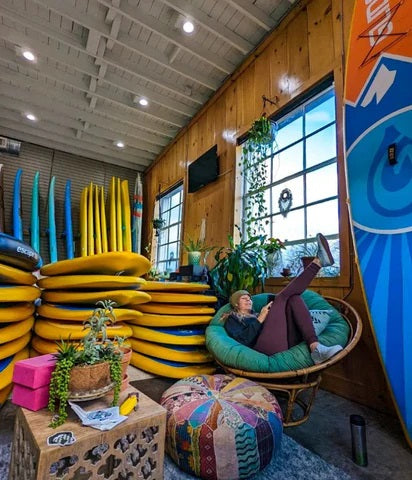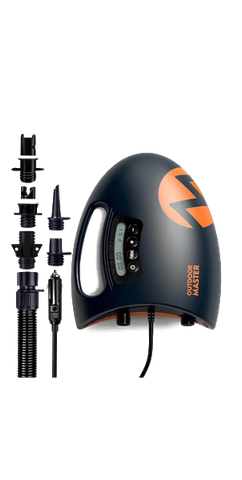
Inflatable paddle board or solid paddle board, some pros and cons.
Inflatable paddle boards (iSUPs) have been gaining in popularity in recent years, as they offer a portable and convenient option for paddle boarders. However, as with any product, there are pros and cons to using an iSUP. In this article, we will explore the advantages and disadvantages of inflatable paddle boards to help you decide if an iSUP is right for you.
Engage in the World of Paddle Boarding with Glide SUP
Introduction

Welcome to the exhilarating world of paddle boarding, a realm where adventure meets tranquility, and the options are as vast as the waters themselves. Among the myriad choices, inflatable paddle boards (iSUPs) stand out, offering unparalleled convenience without sacrificing performance. At Glide, we're passionate about bringing you the best in paddleboarding, whether you're gliding over serene lakes or navigating the gentle swells of the ocean.
Why Choose an Inflatable Paddle Board?
Portability Unleashed
Imagine exploring distant shores or easily carrying your board to that hidden lake; our iSUPs make it possible. Their compact, roll-up design fits into a backpack, freeing you to discover paddleboarding spots previously out of reach.
Space-Saving Design
Our inflatable paddle boards are a dream for the space-conscious. Deflate, roll, and store it in a closet or under a bed. Perfect for apartment dwellers or those with limited storage, our iSUPs ensure your adventure doesn't clutter your living space.
Built Tough for Adventure
Crafted from military-grade PVC, Glide's inflatable paddle boards are designed to endure. They're resilient against punctures and abrasions, ensuring your board is an adventure companion for years to come.
Accessibility for All
Glide believes in making paddleboarding accessible. Our iSUPs are priced to welcome newcomers and seasoned paddlers alike, ensuring quality doesn't break the bank.
Beginner-Friendly Waves
Our boards are forgiving, stable, and designed to keep you upright as you learn. This beginner-friendly nature makes starting your paddleboarding journey as smooth as the waters you'll explore.
Versatility at Its Best
Whether it's yoga, fishing, or a leisurely paddle, our inflatable paddle boards adapt to your activity of choice. Experience versatility that keeps your options open and your adventures varied.
Challenges of Inflatable Paddle Boards
While iSUPs boast many advantages, they have their own set of challenges, such as longer setup times and less rigidity compared to hard boards. However, Glide's advancements in design and technology significantly narrow these gaps, offering a paddleboarding experience that rivals, and sometimes surpasses, that of traditional boards.
Enhanced Performance
Glide iSUPs are engineered for optimal performance. While they are indeed more flexible than hard boards, our unique design and construction techniques provide a level of stiffness and speed that closes the gap on the water.
Convenience Meets Efficiency

With the right tools, like our certified electric pumps, setup becomes a breeze. Spend less time preparing and more time exploring, with quick inflation that gets you on the water faster.
Designed for Durability
Our inflatable boards are not just about easy storage and transport; they're built to last. High-end iSUPs from Glide offer durability on par with traditional boards, ensuring your investment stands the test of time.
Is an iSUP Right for You?
Choosing an inflatable paddle board is a personal decision that balances convenience with performance. For those valuing ease of transport, versatility, and affordability, Glide's iSUPs present an unbeatable option. Consider your paddling goals, storage needs, and budget to find the perfect board for your lifestyle.
Conclusion
Inflatable paddle boards from Glide embody the perfect blend of convenience, performance, and durability. As you embark on your paddleboarding journey, know that choosing a Glide iSUP means investing in quality, innovation, and years of water-bound adventures. Embrace the freedom, embrace the adventure, embrace the Glide experience.


